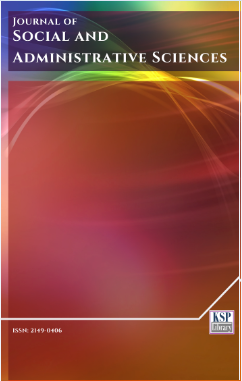Teachers’ Classroom management and Quality Assurance of Students’ Learning Outcome in Secondary Schools in Ondo State, Nigeria
Abstract
Abstract. The study assessed teachers’ classroom management strategies, the level of teachers' classroom instructional tasks and determined the effect on students’ academic performance, and further examined the constraints in classroom management in secondary schools in Akure South Local Government Area of Ondo State, Nigeria. Descriptive survey and ex post facto research designs were adopted. Five research questions and two hypotheses were formulated to guide the study. The sample consisted of 854 respondents, made up of 560 students, 280 teachers and 14 principals selected from 14 secondary schools using simple random sampling technique. Data were collected using “Teachers’ Classroom Management Strategies Questionnaire” (TCMSQ), and “Students’ Academic Performance Proforma” (SAPP). Data were analyzed, using percentage, mean score and Pearson Product Moment Correlation Coefficient at alpha level of 0.05. Findings showed significant relationship between teachers’ classroom management and students’ academic performance (r-cal = 0.307, p<0.05), and significant relationship between teachers' instructional tasks and students' academic performance (r-cal=0.689, p<0.05), while teachers were effective in classroom management strategies as reflected in preparation of lesson notes (71.4%), communication skill (63.6%), students’ motivation (62.5%), group interaction (71.4%) and exemplary behaviour (64.3%). The major constraints faced by teachers were excessive workload (56.4%), ill-equipped laboratory (57.9%), ill-equipped library (63.6%), shortage of instructional materials (64.3%), lack of students’ learning materials (64%) and congested class size (75%). Based on the findings, it was recommended that the Government should employ adequate number of qualified teachers to reduce instructional workload to manageable level. Also, Government in collaboration with the Parents - Teachers Association and other Development Partners should provide adequate learning facilities and materials that would improve classroom management and students’ learning outcome in secondary schools.
Keywords. Classroom management, Technique, Facilities, Instructional materials, Learning outcome.
JEL. H52, H75 I21.
Keywords
References
Adenipekun, O. (2016). WAEC releases best results in 10 years. The Punch, p.14.
Afolabi, F.O.(2002). The school building and its environment: implication on the achievement of functional Universal Basic Education programme in Ondo State. In T. Ajayi, J.O. Fadipe, P.K. Ojedele, & E.E Oluchukwu (Eds.), Planning and Administration of Universal Basic Education in Nigeria. (pp. 101-110). Ondo.
Allington, R.L. (2013). What really matters when working with struggling readers? The Reading Teacher, 66(7), 520-530. doi. 10.1002/TRTR.1154
Allport, G.W & Odbert, H.S. (1936). Trait- names: A psycu-lexical study. Psychological Monographs, 47(1), 1-211. doi. 10.1037/h0093360
Ayeni, A.J. (2016). Private sector involvement in education enterprise and quality learning outcome in secondary schools in Ondo State, Nigeria American Journal of Educational Research. 4(8), 578-587. doi. 10.12691/education-4-8-1
Bangbade, J.O. (2004) Effect of subject matter knowledge in the teaching and learning of biology and physics. Teaching and Teacher Education, 3(2), 102-109. doi. 10.1016/0742-051X(87)90012-6
Brannon, T.S. (2010). The Effects of classroom management beliefs/ideologies on student academic success. Dissertation completed at California State University. [Retrieved from].
Chandra, S. (2015). Classroom management for effective teaching. International Journal of Education and Psychological Research, 4(4), 13-15.
Cho, S., Xu, Y., Rhoded, J.A. (2010). Examining english language learners’ motivation of, and engagement in, reading: a qualitative study. An International Online Journal, 10(2), 208-221.
Earthman, G.I. (2002). School facility conditions and student academic achievement. Los Angeles: University of California’s Institute for Democracy, Education and Access.
Eguridu, C. (2015). 61 percent fail English/Mathematics in 2015 WASSCE. The Punch, 8.
Eguridu, C. (2014). Mass failure as WAEC releases May/June exam results. August 17, [Retrieved from].
Federal Republic of Nigeria. (2013). National Policy on Education. Lagos: NERDC Press.
Hughes, S.A. (2003). An early gap in black-white mathematics achievement holding school and home accountable in affluent city school district. The Urban Review, 35(4), 297-322. doi. 10.1023/B:URRE.0000017532.32745.32
Jill, S. (2007). Collaborative teaching in GS, ‘A workshop to help new General Studies’ instructors prepare their syllabi. California State University, East Bay.
McLeod, S.A. (2016). Id, Ego and Superego. [Retrieved from].
Ondo State Ministry of Education, (2016). Analysis of academic achievement in senior school certificate examinations. Department of Planning, Research and Statistics, Akure.
Owadiae, I. (2012). West African Senior School Certificate Examination results. The Punch, August 11, 8.
Owadiae, I. (2011, August 11). West African Senior School Certificate Examination result. The Nation, , August 11, 4.
Pervin, L.A., & John, O.P. (1999). Handbook of personality: Theory and research, New York: Gilford.
Sanusi, B.Y. (1998). Teachers job performance stress as a correlate to job satisfaction in selected secondary schools in Ife Central Local Government zone of Osun State. Unpublished Masters Thesis. Obafemi Awolowo University, Ile-Ife.
Wenglinsky, H. (2004). Closing the racial achievement gap the role of reforming instructional practices. Education Policy Analysis Archives, 12(64), 32-45. doi. 10.14507/epaa.v12n64.2004
DOI: http://dx.doi.org/10.1453/jsas.v4i2.1312
Refbacks
- There are currently no refbacks.
....................................................................................................................................................................................................................................................................................................................................... Journal of Social and Administrative Sciences - J. Adm. Soc. Sci. - JSAS - www.kspjournals.org
ISSN: 2149-0406
Editor: editor-jsas@kspjournals.org Secretarial: secretarial@kspjournals.org Istanbul - Turkey.
Copyright © KSP Library




